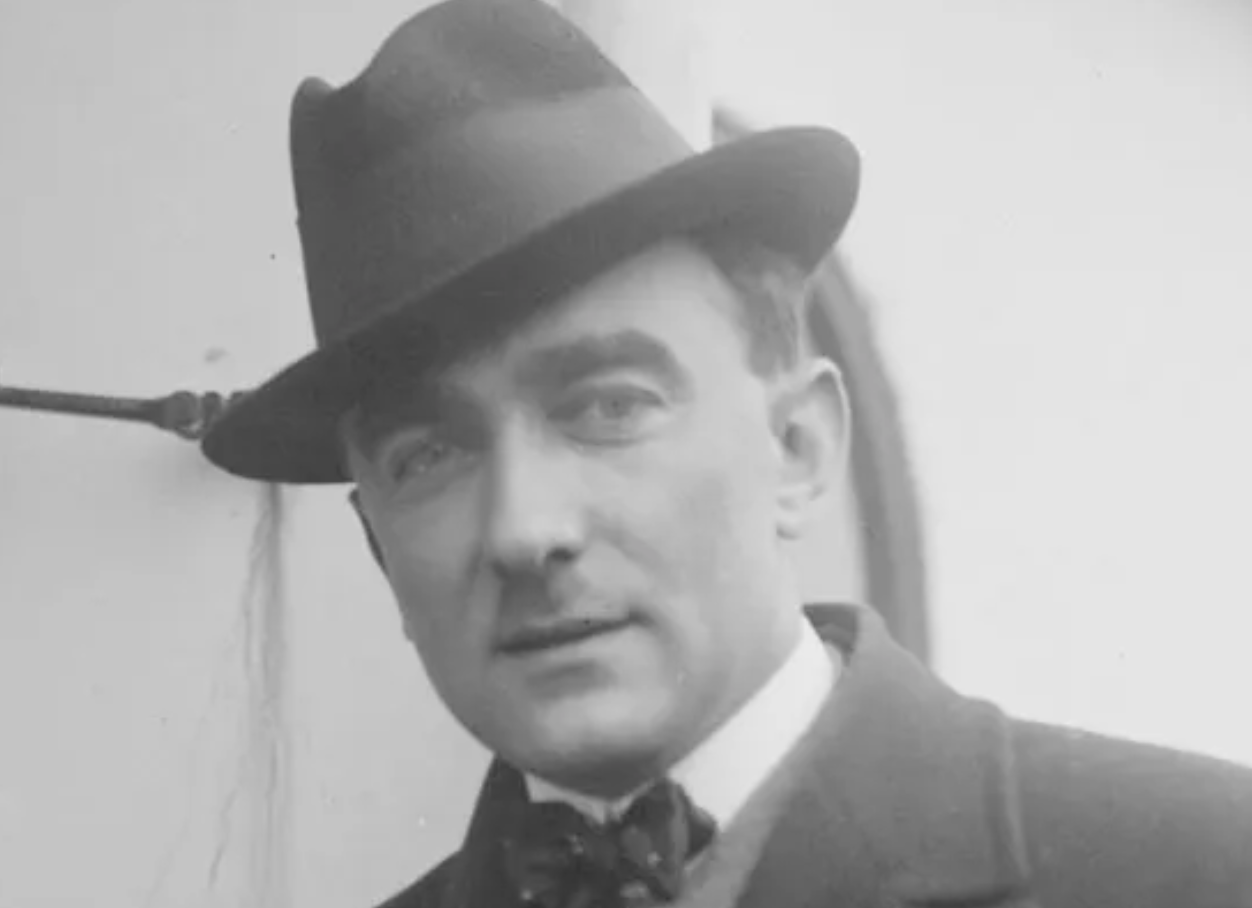On 15 May 2022, the LPC celebrated 75 years since its foundation and what a rich history it has had so far! LPC Alto, Noel Chow who has recently celebrated 15 years with the LPC, has many great memories of concerts and events shared with choir friends. When not singing with the Choir, Noel works for the NHS as a Coordinator in Cancer Services. 2021 was quite a year for Noel. It was a year of events that he did not anticipate but nevertheless, has survived. Aside from the ongoing pandemic, he was diagnosed with a brain tumour and subsequently had surgery to remove it. This is his story of diagnosis in a pandemic, subsequent recovery and how singing in choir has helped with the recovery process.
Diagnosis and treatment
Back in early 2019 I started having vision problems in my right eye which got progressively worse. It started out as a blue grey line going across the centre of my vision with static and desaturation of colour. I thought this was due to long hours staring at the computer screen and possibly stress related. 2019 as a year was eventful; I got married at the end of November and in December, a virus in China was making the rounds on the news. Little did we know what impact this news would have down the line. I was finally seen by an ophthalmologist in March 2020 and after preliminary tests, my right eye was given the all clear but they were unable to explain the vision issues. To be sure, I was referred to a neuro-ophthalmologist to assess for a possible neurological cause. Meanwhile, the seriousness of the global virus had spread, now given the name SARS-CoV-2. At the same time, the Choir was busy rehearsing for concerts, knowing little of what was to come. I caught COVID (though I did not know that at the time), and was quite unwell for several days. Fortunately I managed to recover, though that is a story for another time. From then on, the UK went into the first lockdown. The hospitals were beginning to see an increase in admissions of this dangerous respiratory disease. LPC concerts were cancelled. To maintain continuity in the Choir, social activities and rehearsals were arranged remotely over Zoom. Throughout this time, the vision in my right eye continued to deteriorate. Hospitals across the UK were focused on COVID care and any emergency cases, so my intended clinic appointment with the neuro-ophthalmologist was postponed until COVID cases were more manageable.
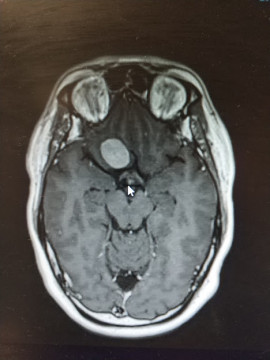
In February 2021, I finally saw the neuro-ophthalmologist and after a plethora of tests including an MRI head scan, I got the diagnosis. It was a large grape-sized tumour growing in my head sitting on top of my right optic nerve near the frontal lobe and arising near the pituitary. I was relieved to have a diagnosis but at this stage they did not know whether it was benign or malignant. The clinical team did not know how long this tumour had been present in my head, but given that a suspected tumour of this sort was slow growing, based on the current size on the scan, they estimated it had been in there for at least a decade. I was only now feeling the effects of the tumour since it had grown to a certain size and was affecting my sight. I dubbed this tumour Grapey McGrapeface (Grapey for short). I was subsequently referred to the National Hospital for Neurology and Neurosurgery at Queen Square and was told surgery was the definitive treatment to remove the tumour completely. I would require a craniotomy, via my right temple. This is considered a routine operation, much like open heart surgery. And as with any surgery, there are risks. One of the risks was bleeding in the brain leading to stroke. Also even if surgery was successful, there was no guarantee that my vision would return. However, leaving the tumour to grow, and it could grow to about the size of a tangerine, would risk irreversible damage to my vision. Needless to say, I was both petrified and fascinated by all of this. I consented to the procedure and a date for surgery was set for April 2021. Bear in mind elective surgery in the NHS during the pandemic was put on hold so I considered myself lucky to be even offered a date for surgery let alone one so quickly after diagnosis.
About two hours after the procedure, I woke up in the recovery ward with a massive bandage on my head and a partially swollen face which subsided after a couple of days. I was discharged from the hospital after a five day stay on the ward. The operation was a success – Grapey had been completely removed. The histology came back as a meningioma, a benign slow growing tumour which in most cases would have been left alone if it did not cause any neurological symptoms. In my case because a neurological issue was present, it was removed. The follow-up MRI showed some swelling in the area formerly occupied by Grapey with no sign of residual disease. I will have yearly MRI scans for the next ten years to make sure there is no recurrence. Importantly, the vision in my right eye returned to normal (hurrah!!). I now sport a faint scar running from the right side of my forehead through my hairline down to the top of my right ear in a backward “C”. This has healed nicely and you would not even know I had any surgery done unless you looked carefully. My surgeon is a miracle worker!
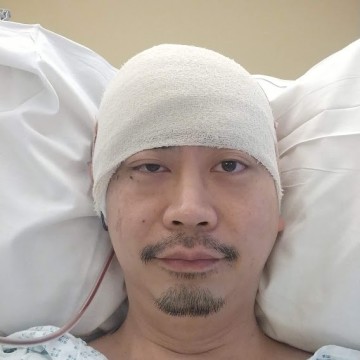 So the long arduous road of recovery from surgery began. Brain trauma recovery is like a rollercoaster – you have slow bits, then really fast bits but it is not predictable. My after-care package was very informative and explained the possible side effects during my recovery. This included fatigue, mood swings, and symptoms of PTSD. Off the bat, fatigue was very much the main issue and I spent most of the first month being mostly sedentary and sleeping frequently. On one occasion I bumped into my neighbour who, having found out about my operation, mentioned that essentially I had been stabbed in the head (with surgical precision but stabbed nonetheless), and that my body was trying to heal from that trauma. What I did not realise was that the fatigue was hiding a more serious issue – that of my emotional and mental state. It is noted that the frontal lobe of the brain is associated with regulating emotional process that controls social interaction, positive and negative moods. Disturbance of this had quite an impact during my recovery. I would later find out this would be known as emotional lability. The second and third months post-surgery were emotionally difficult on top of overcoming fatigue and isolation as I was mostly confined to the flat. I was unable to focus and developed anxiety about whether I would be back to how I was before surgery. I would be weeping at random things or sometimes I would get flashbacks of my previous traumas and embarrassing moments, which previously were tucked away but now broken and the contents spilled out in the open. All these raw emotions kept me constantly on edge. I was a complete emotional wreck internally and expended a lot of energy trying to temper the emotional chaos. A side effect of this was that I was not able to make simple decisions due to lack of focus and my only response was to cry or go to sleep. I got very anxious about social interactions and would prefer to keep to myself. I also got worked up over unresolved issues to the point of obsession. Thank goodness for my wonderful partner, who was unstinting in patience to make sure I was ok. I felt really guilty at times when my frustrations of not being my normal self would be inflicted on my partner, who took it in his stride.
So the long arduous road of recovery from surgery began. Brain trauma recovery is like a rollercoaster – you have slow bits, then really fast bits but it is not predictable. My after-care package was very informative and explained the possible side effects during my recovery. This included fatigue, mood swings, and symptoms of PTSD. Off the bat, fatigue was very much the main issue and I spent most of the first month being mostly sedentary and sleeping frequently. On one occasion I bumped into my neighbour who, having found out about my operation, mentioned that essentially I had been stabbed in the head (with surgical precision but stabbed nonetheless), and that my body was trying to heal from that trauma. What I did not realise was that the fatigue was hiding a more serious issue – that of my emotional and mental state. It is noted that the frontal lobe of the brain is associated with regulating emotional process that controls social interaction, positive and negative moods. Disturbance of this had quite an impact during my recovery. I would later find out this would be known as emotional lability. The second and third months post-surgery were emotionally difficult on top of overcoming fatigue and isolation as I was mostly confined to the flat. I was unable to focus and developed anxiety about whether I would be back to how I was before surgery. I would be weeping at random things or sometimes I would get flashbacks of my previous traumas and embarrassing moments, which previously were tucked away but now broken and the contents spilled out in the open. All these raw emotions kept me constantly on edge. I was a complete emotional wreck internally and expended a lot of energy trying to temper the emotional chaos. A side effect of this was that I was not able to make simple decisions due to lack of focus and my only response was to cry or go to sleep. I got very anxious about social interactions and would prefer to keep to myself. I also got worked up over unresolved issues to the point of obsession. Thank goodness for my wonderful partner, who was unstinting in patience to make sure I was ok. I felt really guilty at times when my frustrations of not being my normal self would be inflicted on my partner, who took it in his stride.
Back to singing
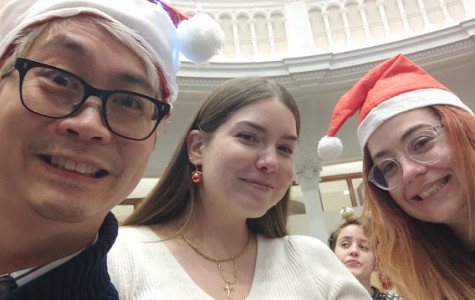 Meanwhile, choir rehearsals/workshops and social activities continued on Zoom. My experiences with singing on Zoom were not fruitful and there were periods where I was reluctant to be involved because I felt inadequate and not emotionally ready. With gentle encouragement from my partner, I continued with the Zoom rehearsals until the choir got back together in real life. However, there was a potential concert scheduled for September 2021 – the opening of the LPO 2021/2022 concert season with Tippett’s The Midsummer Marriage. The feasibility of this going ahead was very much dependent on the government’s stance on the COVID situation. At this point the official UK COVID guidelines kept changing, which affected group singing. The choir committee was proactive on implementing COVID measures to enable members to sing in a large group as safely as possible. Certain COVID restrictions were lifted by the end of June and the choir was able to rehearse in real life. My first singing rehearsal was overwhelming. It was a combination of anxiety and fatigue, so I feared I would not be up to speed with the rehearsal itself and wondered whether I would struggle with the sight-singing. Fortunately, I could cope with the rehearsal speed but I had trouble with sustaining notes and my pitching was a bit wayward. This, I reasoned, could be a result of not singing regularly for over a year due to lockdown and my recovery. I did find that I was still fatigued, lasting half a rehearsal and would have to retire. It was a small step in the right direction. I found focus and a purpose.
Meanwhile, choir rehearsals/workshops and social activities continued on Zoom. My experiences with singing on Zoom were not fruitful and there were periods where I was reluctant to be involved because I felt inadequate and not emotionally ready. With gentle encouragement from my partner, I continued with the Zoom rehearsals until the choir got back together in real life. However, there was a potential concert scheduled for September 2021 – the opening of the LPO 2021/2022 concert season with Tippett’s The Midsummer Marriage. The feasibility of this going ahead was very much dependent on the government’s stance on the COVID situation. At this point the official UK COVID guidelines kept changing, which affected group singing. The choir committee was proactive on implementing COVID measures to enable members to sing in a large group as safely as possible. Certain COVID restrictions were lifted by the end of June and the choir was able to rehearse in real life. My first singing rehearsal was overwhelming. It was a combination of anxiety and fatigue, so I feared I would not be up to speed with the rehearsal itself and wondered whether I would struggle with the sight-singing. Fortunately, I could cope with the rehearsal speed but I had trouble with sustaining notes and my pitching was a bit wayward. This, I reasoned, could be a result of not singing regularly for over a year due to lockdown and my recovery. I did find that I was still fatigued, lasting half a rehearsal and would have to retire. It was a small step in the right direction. I found focus and a purpose.
The many rehearsals served to give me a routine which was very useful in assessing my progress. At every rehearsal I could see improvement in my overall mental wellbeing; namely the feeling of accomplishment, the ability to retain the nuances of what was rehearsed in previous sessions and deep breathing to improve stamina. It is also noted that singing in a choir with my Choir counterparts was also something I missed a lot, being able to sing in harmony and also to sync with your neighbouring voice part is something magical, something I cannot describe. I was still exhausted after a rehearsal but the duration of this exhaustion would lessen over time. The anxiety, although still present, was now manageable and the focus on improving music making was a useful aid in this management. I looked forward to attending rehearsals and just catching up with my Choir mates. I saw myself as a subdued version, but inklings of the old personality were coming back.
There are scientific studies on the effect of singing on mood changes on patients with brain trauma. In one particular study published back in 2004, they observed four male participants with traumatic brain injury in a song-singing programme. Initially the participants reported long-term sadness, anger, fear and fatigue prior to the programme and after, found immediate effects where they could express their catharsis and reported overall improvement in mood. A wonderful resource I found as a recommendation by a friend was a charity called Headway – the brain injury association. Their website has a comprehensive section on the affect of music (participation and listening to) on the recovery process after brain trauma. I related to a lot of the anecdotes they had on their website about improvement in focus, communication, memory retention and overall mood. This is pertinent as Headway is one of the charities heading the Action for Brain Injury Week 2022 which has been running this week.
Here is a shout out to all the NHS workers who have continued to provide a wonderful service under very difficult circumstances. For me, to be treated so quickly after the brain tumour diagnosis during various stages of COVID lockdown was just (forgive the pun) mind-blowing. I did a search online about how much it would have cost to have the craniotomy procedure and the after-care. It came to over £40,000. But thanks to what the NHS represents, this was completely free and for that, I am forever grateful. The NHS continues to be under pressure, more so despite the easing of the pandemic, but thanks to the dedication of clinical and administrative staff, it maintains the ‘business as usual’ mentality.
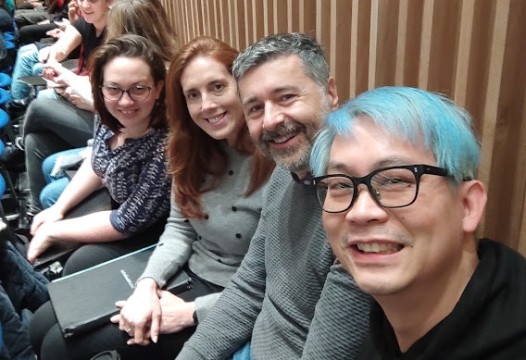 So, on 25 September 2021, we performed The Midsummer Marriage to an enthusiastic response. It was an amazing and emotional time not only for me but for my fellow Choir mates, this was our first performance after a long time. I was singing with my friends, I was focused, I was performing, I was emoting and could see clearly through my right eye again! I had to say though, the earworms from chorus parts were very much present for a few weeks after and I know for certain when I mention the words “Crying as we’re flying…” to my fellow singers. Since then, the LPC have gone on to perform more concerts despite COVID infections spiking occasionally during this period. I remember fondly the Mozart Requiem performed in February 2022. I invited my neurosurgeon along with his son to the concert and they enjoyed it thoroughly. It was a small gesture to thank him for what he was able to do for me. This concert was fortunately recorded for posterity and will be streamed on Saturday 21 May 2022 on Marquee TV. Meanwhile, the LPC continue to perform. Our next major concert will be the performance of Elgar’s The Dream of Gerontius at the BBC Proms. I am definitely looking forward to it!
So, on 25 September 2021, we performed The Midsummer Marriage to an enthusiastic response. It was an amazing and emotional time not only for me but for my fellow Choir mates, this was our first performance after a long time. I was singing with my friends, I was focused, I was performing, I was emoting and could see clearly through my right eye again! I had to say though, the earworms from chorus parts were very much present for a few weeks after and I know for certain when I mention the words “Crying as we’re flying…” to my fellow singers. Since then, the LPC have gone on to perform more concerts despite COVID infections spiking occasionally during this period. I remember fondly the Mozart Requiem performed in February 2022. I invited my neurosurgeon along with his son to the concert and they enjoyed it thoroughly. It was a small gesture to thank him for what he was able to do for me. This concert was fortunately recorded for posterity and will be streamed on Saturday 21 May 2022 on Marquee TV. Meanwhile, the LPC continue to perform. Our next major concert will be the performance of Elgar’s The Dream of Gerontius at the BBC Proms. I am definitely looking forward to it!
So where am I now? It has been a year and a bit since the operation, personally, it is a new version of me with added PTSD. Physically, there are numb patches on my scalp which are slowly regaining sensation. I am now able to lift my right eyebrow albeit slightly. Emotionally, things are still sorting themselves out, but compared to six months prior, a vast improvement to my overall mental health. It is a slow process. One metaphor which comes to mind is the Japanese art of “Kintsugi” or “Golden Joinery”. It is the repair of broken pottery pieces together with gold to augment and display the cracks as part of the new design. The philosophy of Kintsugi is to embrace the imperfections and flaws to highlight the beauty of it. It is a fitting metaphor, whereby the NHS and the support of my friends and family are the gold holding the pieces together. The flaws are there but I continue to improve and hopefully be a better version of whatever this version is. It is still a long road to go, but given how far I have come, I look forward to the journey and to the future.
Come and hear us
Wednesday 31 August 2022
7.30 pm, Royal Albert Hall
Edward Gardner conductor
Jamie Barton mezzo-soprano
Allan Clayton tenor
James Platt bass
London Philharmonic Orchestra
London Philharmonic Choir
Hallé Choir


